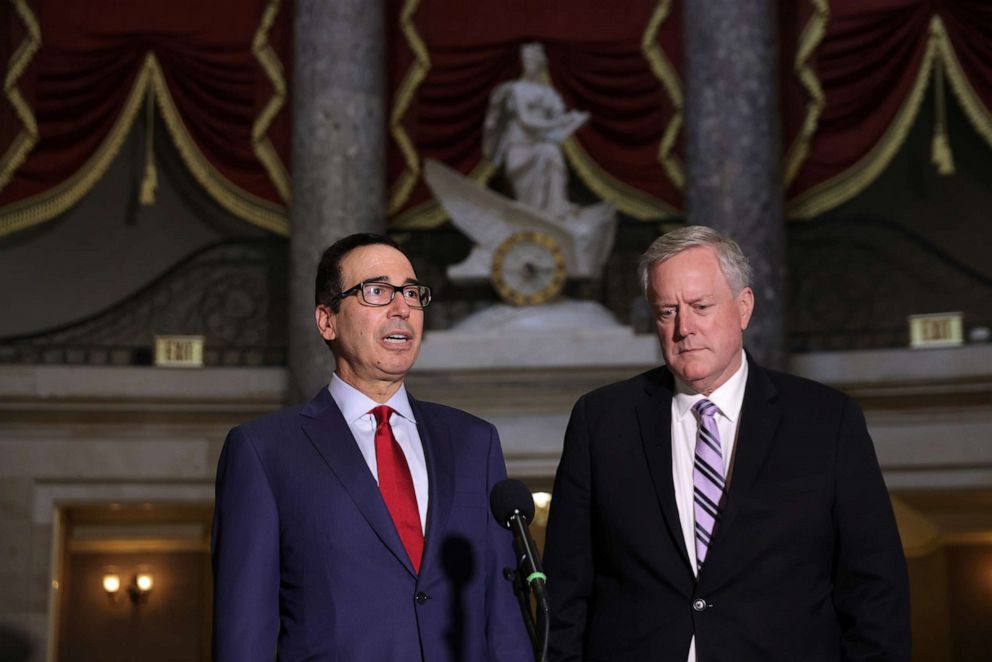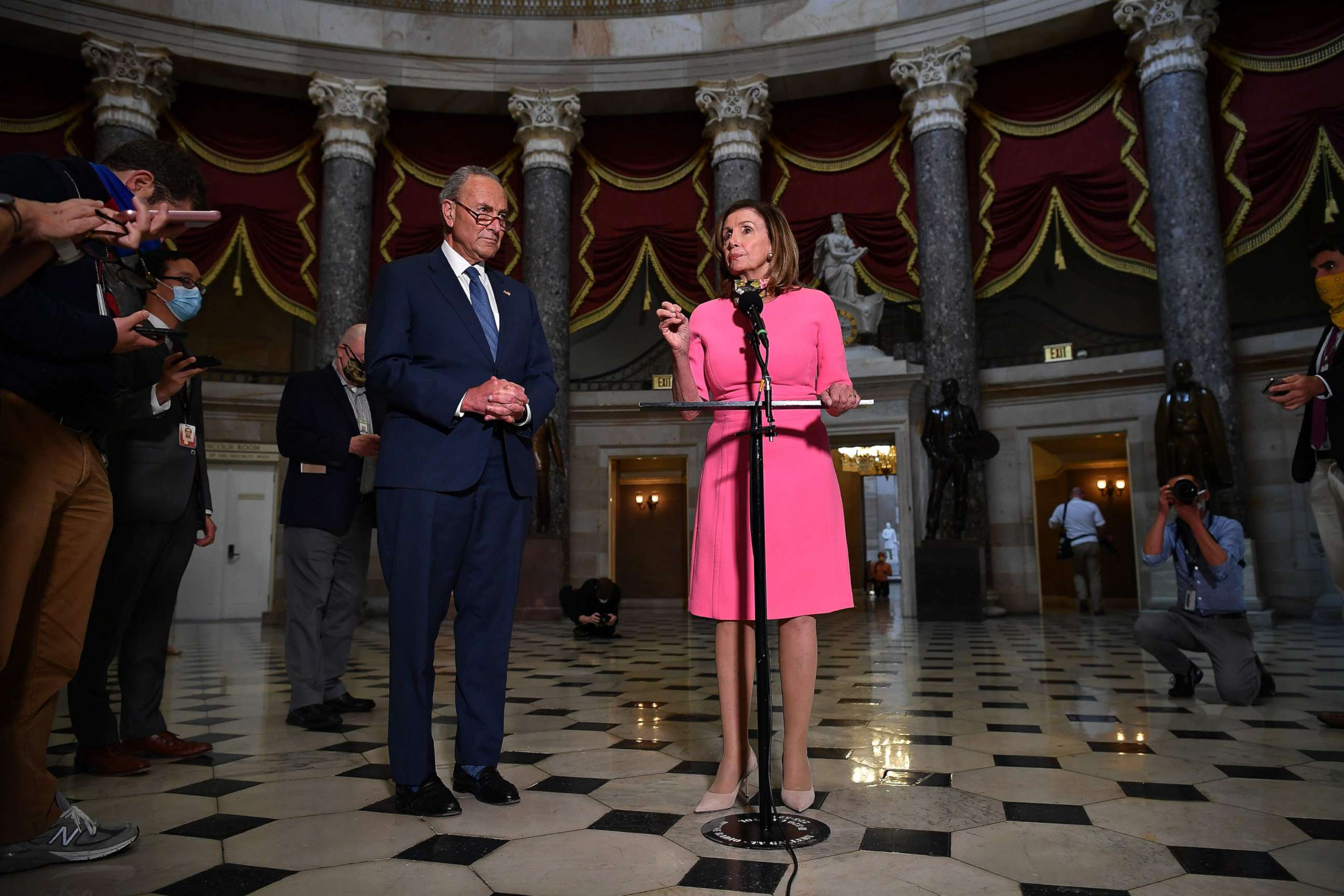Coronavirus relief negotiations hit another wall, talk of merging aid with government funding worries experts
With virus relief aid stuck, focus turns to merging it with government funding
Coronavirus relief talks hit a wall once again Wednesday, as negotiators appeared completely unable to find common ground and lawmakers poised to leave Washington for the month-long August recess.
After five days with no outreach, Treasury Secretary Steven Mnuchin called House Speaker Nancy Pelosi on Wednesday to discuss a way forward, but the speaker, in a joint statement with Senate Democratic Leader Chuck Schumer, made clear that the conversation failed to break the intractable logjam.
"Democrats have compromised. Repeatedly, we have made clear to the Administration that we are willing to come down $1 trillion if they will come up $1 trillion. However, it is clear that the Administration still does not grasp the magnitude of the problems that American families are facing," the two top Democratic negotiators said.
The statement came after Mnuchin appeared on Fox Business pushing Democrats to accept a $1 trillion piecemeal package, something Pelosi and Schumer have refused, saying the size and scale of the pandemic crisis calls for sweeping legislation.
"My view on a negotiation is you agree on the things that you can agree on, pass legislation that's good for the American public, and then come back always for another bill," said Mnuchin, who, along with White House Chief of Staff Mark Meadows, has been negotiating with Democratic lawmakers.

Senate Majority Leader Mitch McConnell, who so far has not been present at the table with negotiators, continued to try to pin the blame for the impasse on Schumer and Pelosi.
"These two individuals are letting the wish lists of wealthy coastal elites stand between every working family in America and the additional help they deserve," McConnell, R-Ky. , said Wednesday.
Mnuchin and Democratic negotiators left the door open to future talks on Wednesday, but the two sides have hardly budged after weeks of negotiations. The broken state of the pivotal talks was shocking to even the most seasoned observers.
"It didn't enter my mind that they wouldn't get a deal," said longtime budget expert Maya MacGuineas, president of the nonpartisan Committee for a Responsible Federal Budget. "This really may be signs of complete dysfunction. It's truly scary that our lawmakers are not able to compromise in order to get something done for the American people. This situation is both more dire and the chance of them coming together is much less, and those two things combined make those observers like me worry about the ability of our lawmakers to find common ground."
With a compromise out of view and lawmakers poised to recess for the month, the path forward for any rescue bill became more fraught as any coronavirus relief aid could possibly be merged with a short-term government funding bill, called a continuing resolution or CR. And any intransigence then -- in a worst-case scenario -- might ultimately lead to a government shutdown.
"That's what it looks like," Senate Appropriations Committee Chairman Richard Shelby said last Thursday of merging coronavirus aid with a CR, adding that passing the 12 regular annual government spending bills by the end of the fiscal year, Sept. 30, was probably not likely. "I think that's the road we're headed down -- a CR. We've been on that track for about a month or so. Unless the Democrats agree, like we have the last two years to all vote together against extraneous things other than appropriations, we're not going to have a markup. We'd just waste everybody's time. So I think we're headed for a CR. I wouldn't say it's inevitable. It's getting close, though."
Former long-time Senate budget director and appropriations staffer William Hoagland told ABC News that he thinks McConnell has always wanted it this way.
"I truly believe, with some collaboration from some current Senate staff, that McConnell has always wanted to move the COVID package to one vote in September tied to a CR," Hoagland, now a Bipartisan Policy Center senior vice president, told ABC News. "Politically, he did not want to force a vote in the Senate and lose maybe half of his caucus. He also did not want to have vulnerable GOP senators this fall take some tough votes he might not be able to control. So, despite what I understand was some statements about getting back to negotiating, with (White House Chief of Staff) Meadows on vacation this week and as you said, Schumer leaving, along with conventions upcoming, no question we are off until after Labor Day on any action.
Asked for a reaction, an aide to McConnell pointed ABC News to the Republican leader's remarks on Wednesday calling on Democrats to set aside what he referred to a "liberal wish list" and get back to the negotiating table.
One senior Senate GOP aide told ABC News that there is a possibility of a CR that would fund the government until sometime into November or potentially through mid-December, but that any final decisions had not yet been made.
To MacGuineas and Hoagland, the choice of a continuing resolution is risky.
"A CR is already a symbol of failure," MacGuineas said. "To combine that with a second failure of not passing an emergency bill that is well thought out and incredibly transparent, to have two failures smooshed into one big bill is basically a massive sign of dysfunction in all of the areas where we should be governing."
Hoagland said, "Without a resolution to a fifth stimulus package, I see no way that many of the same issues in July and early August won't reemerge on a must-do CR bill."
With jobless Americans still numbering in the multi-millions, a moratorium on evictions and utilities' shutoffs having expired and the small business loan program closed -- all due to inaction in Congress -- it remains to be seen where the political blame might land ahead of crucial elections in the fall.
Kyle Kondik, managing editor of Larry Sabato's Crystal Ball who analyzes elections for the UVA Center for Politics, sounded the alarm for Republicans, warning that that the party in power is usually the one that gets the blame if people perceive the state of the country to be in disarray on Election Day.
"To me the stakes are politically higher for Republicans to intervene in the economy. If things get really bad in the fall, they are more likely to face consequences than Democrats are," Kondik told ABC News.

"In terms of Democrats getting blamed for a new aid package not getting passed, I just don't think it works that way. The public is so focused on the president and the party in power; therefore, they're responsible for inaction," said Kondik. "If I were a Republican, I would be trying to figure out what the federal government can do to best stave off economic calamity, and I would try to pass legislation to that effect."
But trying to put pandemic aid on a measure that keeps the federal government funded, likely an exceedingly complicated feat heading into late August and September -- when hurricanes and wildfires could also present more fiscal hurdles -- risks a shutdown, something Hoagland warned was possible.
"While I find it unfathomable that we could even be thinking about a government shutdown on top of everything else one month out from an election, that still is a risk," said Hoagland. "I always think that a shutdown is a pox on both parties. If this were to occur this time around, however, I think the administration and Senate GOP would take most of the blame."
MacGuineas thought the chances of a shutdown were almost nil.
"At some point, the grown-ups have to come out. We can't shut ourselves down when we have a virus that has basically already shut down our economy," MacGuineas said. "There are still some lines we won't cross."
ABC News' Allison Pecorin and Mariam Khan contributed to this story.
What to know about the coronavirus:
- How it started and how to protect yourself: Coronavirus explained
- What to do if you have symptoms: Coronavirus symptoms
- Tracking the spread in the U.S. and worldwide: Coronavirus map
Tune into ABC at 1 p.m. ET and ABC News Live at 4 p.m. ET every weekday for special coverage of the novel coronavirus with the full ABC News team, including the latest news, context and analysis.




